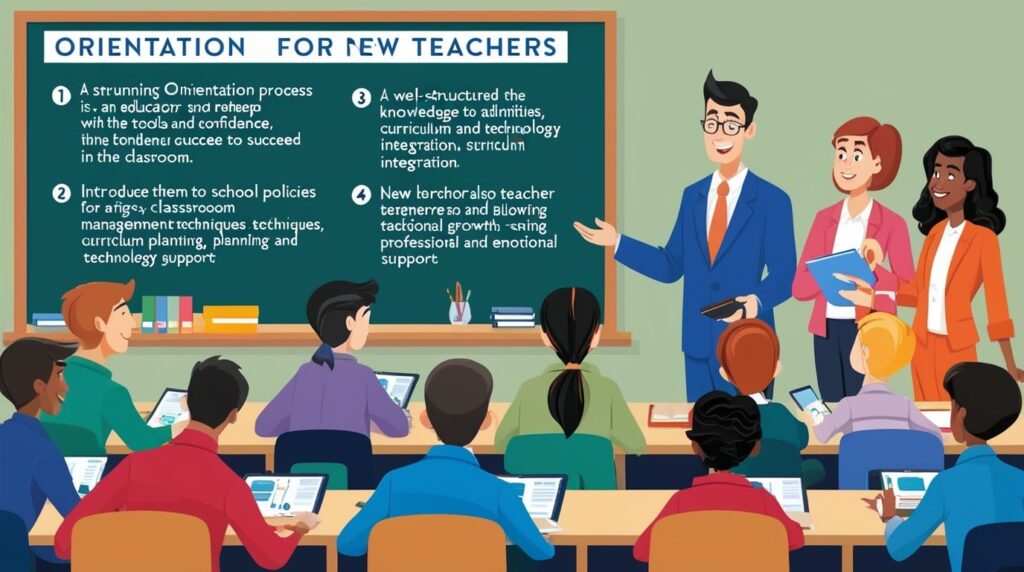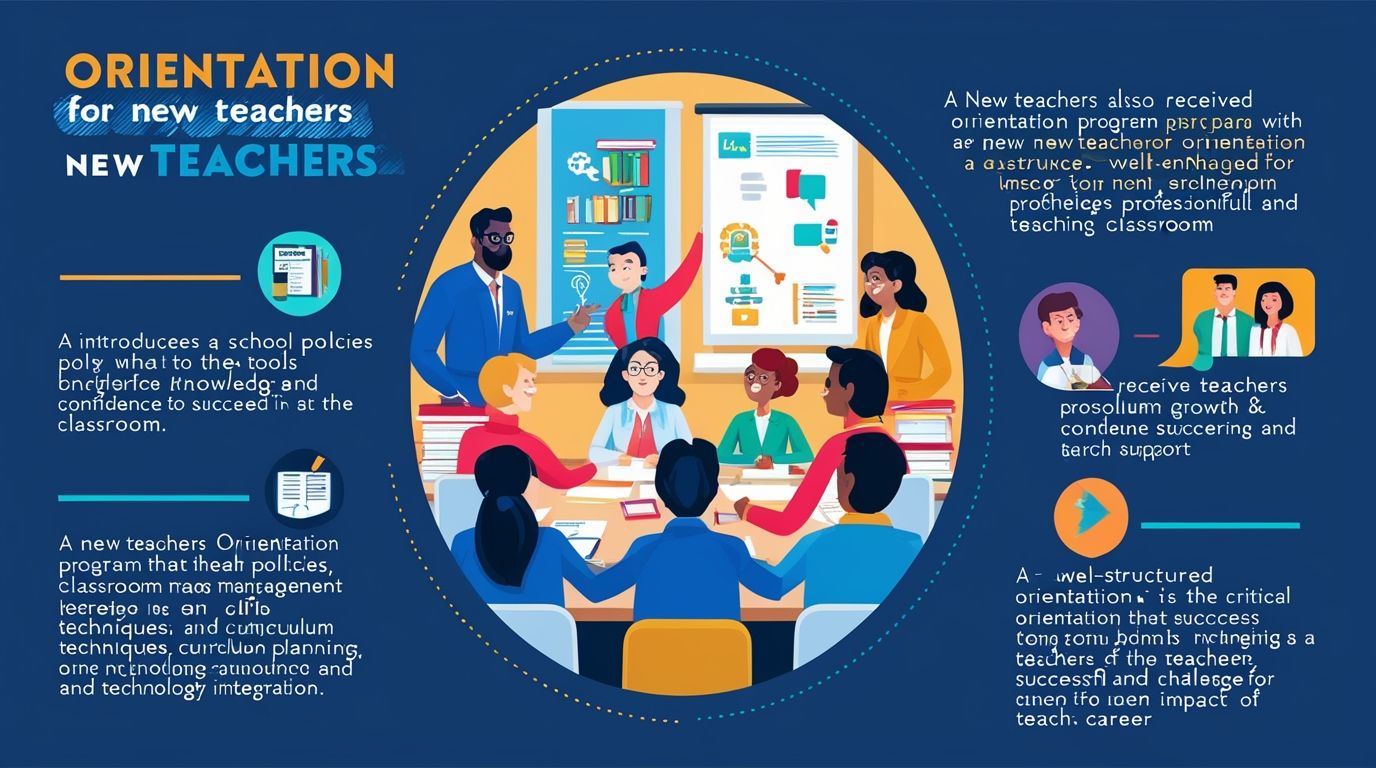Introduction
Orientation for New Teachers, Starting a teaching career is a monumental step in a person’s professional journey. Orientation programs for new teachers are designed to provide them with the skills, knowledge, and confidence necessary to succeed in the classroom. These programs not only address the logistical aspects of teaching but also the emotional and professional challenges that come with educating young minds. This article delves into the key components, benefits, and challenges of orientation for new teachers and provides strategies for making the most of this crucial phase.
Importance of Orientation for New Teachers
Teacher orientation programs are essential for several reasons:
- Building Confidence: New teachers often face feelings of uncertainty as they transition from student-teachers to full-time professionals. A well-structured orientation program helps build confidence by addressing concerns and providing clarity about expectations.
- Understanding School Culture: Every school has its own unique culture, and understanding this early on helps teachers integrate more effectively into their environment. Orientation programs introduce teachers to the school’s mission, values, policies, and daily routines.
- Acquiring Practical Skills: Theoretical knowledge gained in teacher training programs is invaluable, but new teachers often find themselves unprepared for the practical challenges of the classroom. Orientation programs provide practical strategies for classroom management, lesson planning, and student engagement.
- Promoting Professional Growth: A teacher’s orientation isn’t just about survival in the classroom but also about long-term professional development. These programs introduce new teachers to opportunities for professional learning, collaboration with peers, and mentorship.
- Enhancing Retention: One of the most significant benefits of a comprehensive orientation program is its impact on teacher retention. Studies have shown that teachers who undergo thorough orientation and mentorship are more likely to remain in the profession longer than those who do not.
Key Components of Effective Teacher Orientation Programs
An effective orientation program for new teachers should encompass several components, each of which contributes to a well-rounded and prepared educator.
1. Introduction to School Policies and Procedures
New teachers need to familiarize themselves with the school’s policies on issues such as attendance, grading, student behavior, and communication with parents. Understanding these policies early on ensures that teachers can apply them consistently and avoid potential conflicts down the line.
2. Classroom Management Strategies
Classroom management is one of the biggest challenges for new teachers. A good orientation program will offer practical guidance on managing student behavior, maintaining discipline, and creating a positive classroom environment. Teachers can learn from experienced educators about what works and what doesn’t in different classroom settings.
3. Lesson Planning and Curriculum Familiarization
Teachers need to understand the curriculum they will be delivering and how to structure their lessons effectively. During orientation, they can review the curriculum, learn how to develop lesson plans, and align them with educational standards. This training helps ensure that teaching is both purposeful and aligned with broader educational goals.
4. Technology Integration
With the growing reliance on technology in education, new teachers need to be adept at using digital tools to enhance learning. Orientation programs should introduce teachers to any learning management systems (LMS) the school uses, online resources, and how to effectively integrate technology into their teaching practices.
5. Mentorship and Support Systems
An essential part of any orientation program is the assignment of a mentor—an experienced teacher who can provide guidance and support during the initial year of teaching. Mentors offer new teachers advice on classroom management, lesson planning, and dealing with the emotional challenges of teaching.
6. Professional Development and Goal Setting
Orientation programs should encourage new teachers to set personal and professional goals for the year. These goals can range from improving classroom management to mastering new teaching techniques. Schools should also introduce new teachers to opportunities for ongoing professional development, such as workshops, conferences, and peer collaborations.
7. Well-being and Emotional Support
Teaching is emotionally demanding, especially for newcomers. It is crucial that orientation programs address the emotional and psychological aspects of the job. Workshops or sessions focused on work-life balance, stress management, and emotional resilience can be highly beneficial.

Challenges Faced by New Teachers During Orientation
While orientation programs are designed to be supportive, new teachers often face several challenges during this period:
- Overwhelming Information: The sheer volume of information presented during orientation can be overwhelming. Policies, procedures, lesson plans, and classroom management techniques all require attention, making it difficult for new teachers to absorb everything at once.
- Managing Expectations: New teachers often enter the profession with high expectations, only to realize that the reality of teaching can be vastly different. Balancing these expectations with the challenges they face can be difficult.
- Time Management: Many new teachers struggle with time management as they juggle lesson planning, grading, and extracurricular responsibilities. Orientation programs need to provide practical time management strategies.
- Cultural Adjustment: Adapting to a new school culture and environment can be challenging, especially if the teacher is unfamiliar with the community or region. This adjustment period can be stressful, as teachers try to build rapport with students, parents, and colleagues.
- Isolation: Despite being surrounded by students and colleagues, new teachers can often feel isolated. A lack of established relationships in the school can make it difficult for them to seek help or share their challenges openly.
Strategies for Effective Teacher Orientation Programs
To ensure that new teachers gain the most from orientation, the following strategies should be considered:
1. Gradual Onboarding Process
Rather than overwhelming new teachers with too much information at once, orientation programs should adopt a phased approach. For example, the first few weeks can focus on essential policies, classroom management, and curriculum, while subsequent months can introduce more advanced topics like technology integration and professional development.
2. Ongoing Mentorship
While initial orientation sessions are important, ongoing mentorship is key to a teacher’s long-term success. Schools should ensure that mentors are readily available throughout the first year and encourage regular check-ins between mentors and new teachers.
3. Collaborative Learning Communities
New teachers should not feel that they are navigating the challenges of teaching alone. Schools can foster collaborative learning communities where new and experienced teachers meet regularly to share insights, solve problems, and exchange teaching strategies.
4. Personalized Support
Orientation programs should recognize that each new teacher has unique needs based on their background, subject area, and prior experience. Personalized support, such as one-on-one coaching or targeted professional development, can help new teachers overcome their specific challenges.
5. Focus on Teacher Well-being
Teacher burnout is a real concern, especially for those new to the profession. Schools should prioritize teacher well-being by offering resources such as counseling, stress management workshops, and encouraging a healthy work-life balance.
Conclusion
A comprehensive orientation program is the foundation for a successful teaching career. By addressing the practical, emotional, and professional challenges that new teachers face, orientation programs help build a strong teaching workforce that can inspire, educate, and engage students effectively. With proper support and guidance, new teachers can thrive in their roles and make a lasting impact in the classroom. Ensuring that they are well-prepared, confident, and supported is not only beneficial for the teachers themselves but also for the students and the school community as a whole.
References:
- Wong, H. K., & Wong, R. T. (2009). The First Days of School: How to Be an Effective Teacher. Harry K. Wong Publications.
- Ingersoll, R., & Strong, M. (2011). The Impact of Induction and Mentoring Programs for Beginning Teachers: A Critical Review of the Research. Review of Educational Research, 81(2), 201-233.
- Darling-Hammond, L. (2003). Keeping Good Teachers: Why It Matters, What Leaders Can Do. Educational Leadership, 60(8), 6-13.
- Smith, T. M., & Ingersoll, R. M. (2004). What Are the Effects of Induction and Mentoring on Beginning Teacher Turnover? American Educational Research Journal, 41(3), 681-714.

11 thoughts on “Orientation for New Teachers”
Comments are closed.